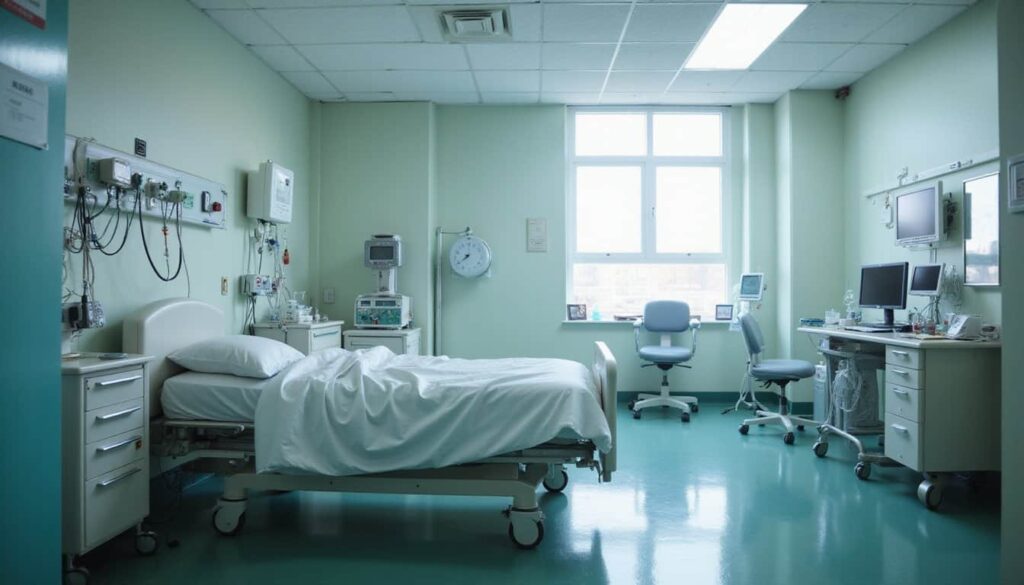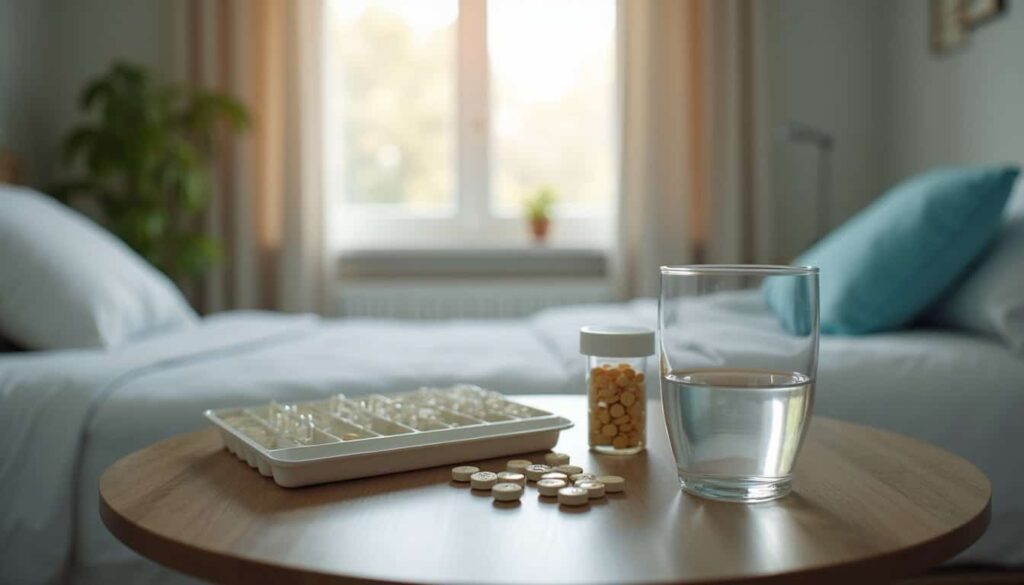Your recovery journey involves healing both body and mind over several months. You’ll need to incorporate regular physical activity to reduce cravings, improve mood, and normalize sleep patterns. Addressing co-occurring mental health challenges like depression and anxiety through integrated care is essential for sustained recovery. Building strong support networks through peer groups and recovery services enormously improves your outcomes. You can prevent relapse by monitoring your physical needs, creating personalized coping strategies, and developing healthy daily routines that support your long-term wellness goals.
Understanding the Recovery Journey: What to Expect From Your Body and Mind

When you stop using substances, your body immediately begins a complex healing process that affects every system, from your brain chemistry to your cardiovascular function. During the first two weeks, you’ll likely experience acute withdrawal symptoms, including physical discomfort, anxiety, and intense cravings. These challenges are temporary markers of your body’s adjustment.
Over the next three to six months, neuroplastic changes reshape your brain’s reward pathways, making managing cravings progressively easier. You’ll notice gradual improvements in mood, memory, and attention as new neural connections form. However, emotional resilience doesn’t develop overnight; anxiety, depression, and unresolved trauma may surface as substances no longer mask underlying issues.
Understanding this timeline helps set realistic expectations. Recovery isn’t linear, but each day of abstinence supports profound biological restoration and cognitive healing. The brain’s capacity for forming new neural connections enables this healing process, allowing you to regain functioning that addiction had compromised. Many individuals move through distinct phases, from initially denying the problem to actively implementing strategies that support long-term sobriety. Building healthy routines and hobbies helps fill the void left by addiction and provides structure that reinforces your commitment to wellness.
The Powerful Role of Physical Activity in Restoring Health After Substance Use
Physical activity offers one of the most effective, and underutilized tools for healing during recovery. Exercise doesn’t just improve fitness, it rewires your brain’s reward pathways, reduces cravings, and lowers relapse rates by up to 25% in structured programs. You’ll experience natural mood elevation through endorphin release while building immune resilience and sleep regulation your body desperately needs.
Exercise rewires your brain’s reward system, cuts cravings, and can reduce relapse rates by 25% while naturally elevating your mood.
Consider these evidence-based benefits:
- Craving reduction: Regular aerobic exercise decreases drug cravings and distracts from compulsive substance-seeking behaviors
- Mental health improvement: Physical activity alleviates depression, anxiety, and stress, all major relapse triggers
- Sleep regulation: Exercise normalizes disrupted sleep patterns common in early recovery
- Immune resilience: Activity strengthens your body’s defenses during vulnerable healing periods
- Chronic disease prevention: Incorporating regular physical activity reduces chronic disease risk that often accompanies long-term substance use
You don’t need intense workouts, even low-intensity, consistent movement supports sustainable recovery. Exercise also adds structure to the day, helping you establish healthy routines that replace substance-seeking behaviors. The most successful programs tailor exercise to individual preferences, recognizing that personalized approaches improve both participation and long-term adherence.
Addressing Mental Health Challenges: Depression, Anxiety, and Cognitive Function

Mental health challenges don’t just accompany addiction; they’re often deeply intertwined with it, creating a cycle that requires thorough attention during recovery. Depression affects your ability to maintain sobriety, directly influencing relapse risk and treatment outcomes. Anxiety disorders complicate recovery further, with comorbidity rates showing significant overlap with substance use disorders. You’ll also likely experience cognitive deficits, impaired memory, attention, and executive function, that can persist for months or years.
Addressing these challenges requires integrated care. While 70.8% of adults with serious mental illness receive treatment, combining formal therapy with mindfulness-based interventions and peer-led support groups produces the strongest outcomes. Understanding that the median number of recovery attempts is just 2 before achieving lasting recovery can provide realistic hope and motivation during your treatment journey. Recovery significantly improves mental well-being, with 92.6% rating their mental health positively after achieving recovery. Your cognitive function will gradually improve with abstinence, enhancing your engagement in therapy and daily life.
Building Support Systems and Creating Recovery-Friendly Environments
Recovery doesn’t happen in isolation; it’s built through connections with people, services, and environments that actively support your path forward. Combining clinical treatment with recovery support services produces dramatically/considerably/substantially better outcomes than either approach alone. Community-based support programs help you access housing, employment, and vocational services, each directly linked to reduced substance use.
Strengthen your recovery foundation through:
- Peer-led mentorship groups like AA or NA, which increase abstinence rates and improve quality of life
- Recovery support services that connect you with housing, job training, and financial resources
- Social networks centered on abstinence, larger networks with more sober members, predict better outcomes
- Mutual help organizations that provide ongoing peer support and accountability
More than half of people achieve remission without formal treatment, demonstrating community support’s powerful role. Recovery support services are particularly effective at engaging people into care who have limited access to traditional treatment or face multiple barriers to recovery. The quality of your social connections matters just as much as the quantity; strong social support predicts treatment retention, more days abstinent, and greater confidence in maintaining sobriety.
Preventing Relapse Through Healthy Habits and Evidence-Based Strategies

Successful long-term recovery depends on combining evidence-based strategies with daily practices that address both the psychological patterns and practical situations that lead to relapse. Cognitive-behavioral therapy equips you with essential skills to recognize connections between your thoughts, feelings, and substance use triggers. Mindfulness-based strategies keep you present, reducing stress and increasing awareness of emotional responses before they escalate. You’ll benefit from identifying your high-risk situations, specific people, places, and internal states that threaten your recovery.
Life skills development includes establishing structured routines, practicing stress management through exercise and deep breathing, and recognizing vulnerability states captured in the HALT acronym: Hungry, Angry, Lonely, Tired. Creating a personalized relapse prevention plan with specific coping techniques transforms abstract concepts into actionable steps supporting your sustained recovery. Building a recovery-oriented support network helps decrease the sense of isolation that significantly increases your risk of relapse.
Frequently Asked Questions
How Long Does It Take for Brain Chemistry to Normalize After Addiction?
Your brain’s neurotransmitter regulation begins improving within the first month, though complete normalization takes considerably longer. You’ll notice dopamine receptor function starting to recover around 1-3 months, with substantial progress by six months. However, full recovery varies widely; most people need 12-24 months for significant healing. Your brain’s timeline depends on addiction severity and substance type. With sustained abstinence, you’re giving your neurochemistry the best chance to rebalance naturally through neuroplasticity.
Can I Recover Without Attending Formal Treatment Programs or Support Groups?
Yes, you can recover without formal treatment; over 60% of people do. Self-directed recovery approaches work best if you have less severe addiction, stable social support, and no serious co-occurring mental health issues. However, severe substance dependence often requires professional help. Community-based recovery programs offer middle-ground options beyond traditional treatment. Your personal circumstances, addiction severity, and available resources should guide your decision. There’s no single “right” path to recovery.
What Specific Foods or Supplements Support Physical Recovery From Substance Use?
You’ll benefit most from nutrient-dense whole foods like lean proteins, leafy greens, and healthy fats to rebuild your body after substance use. Incorporating bananas, blueberries, and yogurt supports brain chemistry and gut health. Vitamin supplements, especially B-complex, vitamin C, magnesium, and zinc, address common deficiencies and ease withdrawal symptoms. You don’t need perfection; gradually adding these foods while staying hydrated helps stabilize blood sugar, reduce cravings, and support your body’s natural healing process during recovery.
Is It Safe to Start Intense Exercise Immediately After Quitting Substances?
No, it’s not safe to start intense exercise right after quitting substances. Your body needs time to stabilize from withdrawal and physical deconditioning. Instead, establish a consistent exercise schedule with moderate activities like walking or yoga. Medical clearance is essential before beginning any regimen. Focus on a gradual exercise increase as your fitness improves, this approach reduces injury risk, supports emotional stability, and considerably lowers relapse rates compared to jumping into high-intensity workouts immediately.
How Do I Handle Relationships Damaged During Active Addiction While Recovering?
Start by taking responsibility for past harm and offering sincere apologies, understanding that rebuilding trust takes time. You’ll need patience; years of damage won’t heal overnight. Focus on setting boundaries that protect your recovery while demonstrating consistent, changed behavior. Consider couples or family counseling to improve communication and navigate conflict constructively. Remember, some relationships may not survive, and that’s okay. Prioritize connections that support your sobriety and recognize small steps forward as meaningful progress.










